Jun 8, 2015 | Non categorizzato
In the face of immense challenges which also the European society has to tackle – particularly this year, after the attacks in Paris and Copenhagen – one can feel the growing distrust within and between communities. Already at the start of the 1990s, on the initiative of Jacques Delors, the EC President at that time, dialogue with the Churches and the non-religious organisations had been an occasion for an exchange of views on European politics between institutions and the main players of civil society. How can we live together and build a society in which every person and community can feel at home and safe? How can we find ways of accepting the differences when substantially there is no agreement? These are some of the open questions the religious leaders will confront together.. Also the President of the Movement, Maria Voce has accepted the invitation to participate, underlining how the priority of the Focolare is to “build bridges through respectful dialogue at various levels, and to contribute to the peaceful coexistence and fraternity between people of diverse faiths and the most varied ethnic and social origins.”
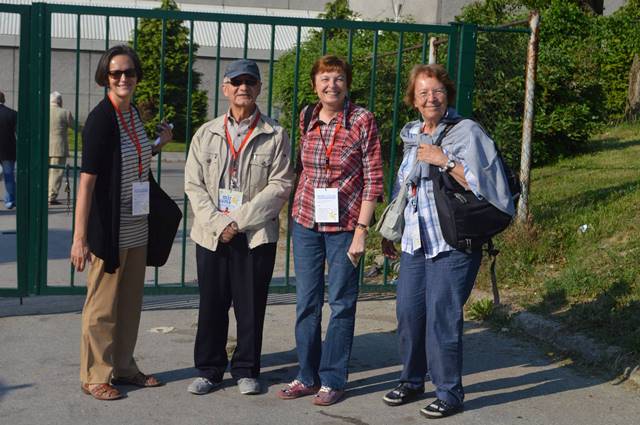
Jun 8, 2015 | Non categorizzato
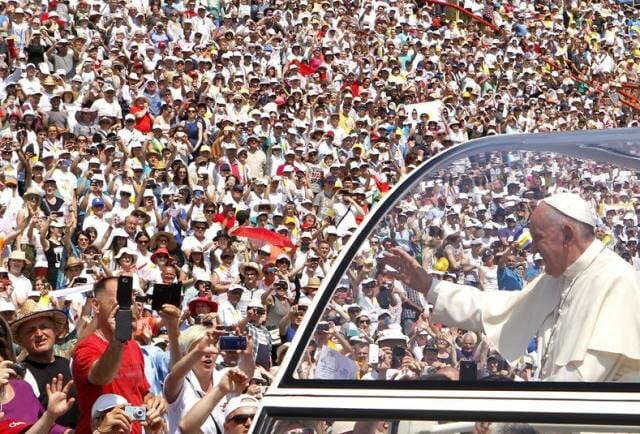 We are breathing an air of peace,” Cardinal Puljic had exclaimed on the vigil of the Pope’s arrival. The city was expecting him with much joy and had begun preparing for his visit several months in advance. Rumuors that had put the security on guard were put to rest by the concerted preparatory efforts Church and State working in harmony. This effort and the willingness of the citizens in following the rules allowed everything to turn out quite well.” Sarajevo, the city that John Paull II called the European Jerusalem was festively awaiting sthe Pope. Peace be with you was the motto of the Pope’s visit to Bosnia and Herzegovina, “a land tested by conflicts, the latest of which is still very present in the memory of “Bosnians, Serbs and Croats,” as Novi Svijet Gina Perkov (Croatia) writes. “The war has indeed had tragic consequences: death, destruction and the exile of so many people. The number of Catholics (primarily Croation) has been reduced by half.” The population was grateful that, this time, the eyes of the world were fixed on them for a happy reason, and hopeful that this fact might help in resolving several political questions; one being that “several EU countries are culpable for having permitted and assisted the ethinic cleansing,” as attested to in a recent book by Bishop Franjo Komarica, Bishop of Banja Luka, Serb Republic. During the Eucharistic Celebration at the Olympic Stadium of Kosevo in the presence of 70 thousand people – 23 thousand of them, Croation – the Pope offered a strong message of peace. “Peace is the dream of God, the plan of God for humankind. . . Today, the cry once more arises from the people of God and from all people of good will: War never again! Making peace is an artisanal task: it requires passion, patience, experience, tenacity. Blessed are they who sow peace through their daily actions, with attitudes and gestures of service, fraternity, dialogue, forgiveness. . . Peace is the work of justice. . . practiced, lived out justice. True justice is doing to the other person, to the other people, what I would want to be done to me, to my people. Peace is a gift from God, because it is the fruit of his reconciliation with us. . . Today let us together ask the Lord for a simple heart, for the grace of patience,” he concluded. In the afternoon, Pope Francis met at the cathedral with priests, men and women Religious and consecrated people and, in the end, with young people. The Focolare Movement offered gifts to the Pope and attended all the moments of encounter.
We are breathing an air of peace,” Cardinal Puljic had exclaimed on the vigil of the Pope’s arrival. The city was expecting him with much joy and had begun preparing for his visit several months in advance. Rumuors that had put the security on guard were put to rest by the concerted preparatory efforts Church and State working in harmony. This effort and the willingness of the citizens in following the rules allowed everything to turn out quite well.” Sarajevo, the city that John Paull II called the European Jerusalem was festively awaiting sthe Pope. Peace be with you was the motto of the Pope’s visit to Bosnia and Herzegovina, “a land tested by conflicts, the latest of which is still very present in the memory of “Bosnians, Serbs and Croats,” as Novi Svijet Gina Perkov (Croatia) writes. “The war has indeed had tragic consequences: death, destruction and the exile of so many people. The number of Catholics (primarily Croation) has been reduced by half.” The population was grateful that, this time, the eyes of the world were fixed on them for a happy reason, and hopeful that this fact might help in resolving several political questions; one being that “several EU countries are culpable for having permitted and assisted the ethinic cleansing,” as attested to in a recent book by Bishop Franjo Komarica, Bishop of Banja Luka, Serb Republic. During the Eucharistic Celebration at the Olympic Stadium of Kosevo in the presence of 70 thousand people – 23 thousand of them, Croation – the Pope offered a strong message of peace. “Peace is the dream of God, the plan of God for humankind. . . Today, the cry once more arises from the people of God and from all people of good will: War never again! Making peace is an artisanal task: it requires passion, patience, experience, tenacity. Blessed are they who sow peace through their daily actions, with attitudes and gestures of service, fraternity, dialogue, forgiveness. . . Peace is the work of justice. . . practiced, lived out justice. True justice is doing to the other person, to the other people, what I would want to be done to me, to my people. Peace is a gift from God, because it is the fruit of his reconciliation with us. . . Today let us together ask the Lord for a simple heart, for the grace of patience,” he concluded. In the afternoon, Pope Francis met at the cathedral with priests, men and women Religious and consecrated people and, in the end, with young people. The Focolare Movement offered gifts to the Pope and attended all the moments of encounter.  The spirituality of unity arrived in Bosnia and Herzegovina in 1975 through several young people who had attended the Mariapolis of Zagabria, Croatia. In 1992, war broke out: countless were lost, destruction, death and refugees. Many, many people fled to the different countries of Europe. There was a huge effort to continue to support those who had stayed behind, but since roads were closed only a few letters and foodstuffs were able to reach the people. Through the love of the people who lived the spirituality of unity, many Muslims and Christians found a point of encounter in the Ideal of unity. When the war ended and they returned to Bosnia, they themselves became the bearers and witnesses of this new spirit. “At the beginning of 1996 it finally possible to go to them, in spite of the war,” say some witnesses to the events. We were met by rubble everywhere, crumbling houses, armoured vehicles, constant police surveilance and, once in a while, an exploding grenade. . . The city of Sarajevo was treeless because they had all been burned by the people who tried to warm themselves during the freezing winters.” The first spark of the Ideal of unity that had been welcomed by several people many years earlier, and treasured in their hearts, burst into flames during the war among a people marked by suffering, in need of so many things, who were able to intuit what was essential, thirsty for something true. They were Catholics, but also Muslims and Orthodox, all of them grateful for the discovery of God-Love which had transformed their lives. The current situation Bosnia is still unresolved. The Catholics emigrate, especially the young, and their is fear of future conflict. The Focolare community draws its strength from unity, a small sign of that unity which was desired by John Paul II in 1997 when he visited and wished for Sarajevo that after the war, it would become the convincing model of the third millenium.
The spirituality of unity arrived in Bosnia and Herzegovina in 1975 through several young people who had attended the Mariapolis of Zagabria, Croatia. In 1992, war broke out: countless were lost, destruction, death and refugees. Many, many people fled to the different countries of Europe. There was a huge effort to continue to support those who had stayed behind, but since roads were closed only a few letters and foodstuffs were able to reach the people. Through the love of the people who lived the spirituality of unity, many Muslims and Christians found a point of encounter in the Ideal of unity. When the war ended and they returned to Bosnia, they themselves became the bearers and witnesses of this new spirit. “At the beginning of 1996 it finally possible to go to them, in spite of the war,” say some witnesses to the events. We were met by rubble everywhere, crumbling houses, armoured vehicles, constant police surveilance and, once in a while, an exploding grenade. . . The city of Sarajevo was treeless because they had all been burned by the people who tried to warm themselves during the freezing winters.” The first spark of the Ideal of unity that had been welcomed by several people many years earlier, and treasured in their hearts, burst into flames during the war among a people marked by suffering, in need of so many things, who were able to intuit what was essential, thirsty for something true. They were Catholics, but also Muslims and Orthodox, all of them grateful for the discovery of God-Love which had transformed their lives. The current situation Bosnia is still unresolved. The Catholics emigrate, especially the young, and their is fear of future conflict. The Focolare community draws its strength from unity, a small sign of that unity which was desired by John Paul II in 1997 when he visited and wished for Sarajevo that after the war, it would become the convincing model of the third millenium.
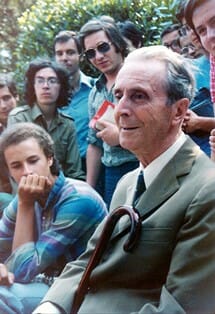
Jun 7, 2015 | Non categorizzato
 “To me, Chiara Lubich’s talks on the Eucharist were like a revelation that led me to a broader and more precise knowledge of the Eucharist’s deep impact not only on the individual but on society. I saw that the progress of Christian conscience in the individual and in society depends on the depth of the knowledge Christians have of the Eucharist. In other words: if we know what the Eucharist is, and we live its reality as such, we can draw forth from Christianity the deepest value our soul and society needs. In fact the Eucharist unites man with God and is the mystery of Christ’s love for humanity. It is communion with Christ and our brothers; it is unity with both. If we want to see the progress of society’s highest communitarian and universal aspirations that oppose egoism, racisms, tyrannies of sorts, etc., we have to make the Eucharistic conscience grow, and live it profoundly. We can say that the relationship with God and man himself is a Eucharistic mystery in which God makes himself man because man can be like God. It is nothing less than that. With her explanations, Chiara makes us consciously enter not only into the mentality of Christ, but into his humanity and divinity. She wants us to coexist, through the sacramental communion, with both the divinity and humanity of Jesus. It is a revolution that defies man and sets him in contrast with and above the process of moral degradation besetting society today. The revolt against death starts from the Eucharist. Chiara has thus stamped on our lives a mark of heroism and sanctity. There is no need for mediocrity to be able to live within human coexistence. What comes to mind is the question the angel asked the souls that entered Dante’s purgatory: “Oh you humans who have been born to fly – why have you fallen under the breeze?” Meaning to say, oh man, why do you, who are born to fly to God, let yourself fall into sin so easily and lose this chance to fly? Sanctity is heroism, but which is immensely facilitated by daily nutriment of the Eucharistic bread. It implies a daily, assiduous devotion, going one step higher each day, beyond the mediocrity in which a greater part of humanity lives in today. This mediocrity consists in lies, lust, thefts, and violence which is not a way of living but of stupidly organising our own agony. The Eucharist gives us wings to fly!” Igino Giordani, The Eucharist gives us wings to fly, «GEN» November 2004, pp.10-11
“To me, Chiara Lubich’s talks on the Eucharist were like a revelation that led me to a broader and more precise knowledge of the Eucharist’s deep impact not only on the individual but on society. I saw that the progress of Christian conscience in the individual and in society depends on the depth of the knowledge Christians have of the Eucharist. In other words: if we know what the Eucharist is, and we live its reality as such, we can draw forth from Christianity the deepest value our soul and society needs. In fact the Eucharist unites man with God and is the mystery of Christ’s love for humanity. It is communion with Christ and our brothers; it is unity with both. If we want to see the progress of society’s highest communitarian and universal aspirations that oppose egoism, racisms, tyrannies of sorts, etc., we have to make the Eucharistic conscience grow, and live it profoundly. We can say that the relationship with God and man himself is a Eucharistic mystery in which God makes himself man because man can be like God. It is nothing less than that. With her explanations, Chiara makes us consciously enter not only into the mentality of Christ, but into his humanity and divinity. She wants us to coexist, through the sacramental communion, with both the divinity and humanity of Jesus. It is a revolution that defies man and sets him in contrast with and above the process of moral degradation besetting society today. The revolt against death starts from the Eucharist. Chiara has thus stamped on our lives a mark of heroism and sanctity. There is no need for mediocrity to be able to live within human coexistence. What comes to mind is the question the angel asked the souls that entered Dante’s purgatory: “Oh you humans who have been born to fly – why have you fallen under the breeze?” Meaning to say, oh man, why do you, who are born to fly to God, let yourself fall into sin so easily and lose this chance to fly? Sanctity is heroism, but which is immensely facilitated by daily nutriment of the Eucharistic bread. It implies a daily, assiduous devotion, going one step higher each day, beyond the mediocrity in which a greater part of humanity lives in today. This mediocrity consists in lies, lust, thefts, and violence which is not a way of living but of stupidly organising our own agony. The Eucharist gives us wings to fly!” Igino Giordani, The Eucharist gives us wings to fly, «GEN» November 2004, pp.10-11
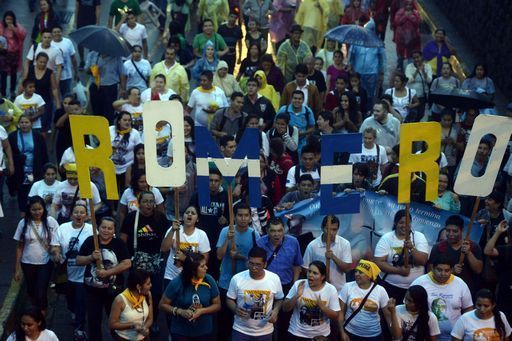
Jun 6, 2015 | Focolare Worldwide
 “The last time we ever saw anything like this was when Pope John Paul II visited in 1983,” writes Filippo Casabianca, from El Salvador. It is a land with a population of 6 million people in an area of 21 thousand km2 that had amongst its sons this bishop who is widely recognized as one of the most important ecclesial figures of the American continent. The Cause had been opened by Bishop Rivera y Damas, his successor as shepherd of the Diocese, on the tenth anniversary of his death on March 24, 1980. That was the year Marita Sartori and Carlo Casabeltrame visited three Franciscan friars who had begun to spread the ideal of unity in El Salvador. In that tragic decade, which opened with the murder of Archbishop Romero and culminated with the murder of 7 Jesuits, their housekeeper and her daughter, the Focolare Movement spread in an extraordinary way in several points of the country, in the midst of a theatre of war. The women’s focolare was opened in 1989 in spite of the danger for the foreign focolarine who went to live there. Since then the country has been through a process that led to the signing of a peace treaty in 1992, and then to a more democratic form of governement with some political stability, but not the long desired reconciliation that today is expressed in a destructive polorization. To this is added the scourge of insecurity because of the proliferation of young criminal gangs and of large segments of the country. The Focolare community are involved in many projects in support of disadvantaged families, through programmes of the New Families Project and the Action for a United World, that have allowed hundreds of children to complete their education supported by the projects of educational centres for poor children, and through interventions in one at-risk quarter for the promotion of social integration. With Romero’s Beatification the awareness of an historic opportunity has grown amongst the people. His message is being preceived as a medicine that could contribute to overcoming opposing views, healing hearts that have been hardened by resentment, and provide what is most necessary in the process of reconciliation. Maribel remarks: “It is a challenge that begins with following the example of Archbishop Romero, which for me continues to help me and my students to nurture peace and justice in people’s hearts .” Whereas, for Amaris: “the celebration will have to give way to reconciliation that lies in forgiving and asking to be forgiven, to heal wounds that are still festering.” Commitment to unity and reconciliation have always been present in the Focolare community, but now they take on the new connotation of a mandate in light of the heroic witness of Archbishop Romero “who knew how to weep with those who weep,” Flora Blandon observed, “and rejoice with those who had a reason to rejoice. The Beatification is the recognition of his life that was anchored in love.” In the messages sent by Pope Francis to the current Archbishop of El Salvador, Josè Luis Escobar Alas, the Pope calls Romero “one of the best sons of the Church,” attributing him with the characteristics of the Good Shepherd who was so dear to him. “Because (God) had bestowed upon the bishop martyr the capacity to see and listen to the suffering of his people and to shape his heart that, in his name, he might guide and illumine.” Francis also also recognised his exemplarity and invited all to encounter in the figure of Romero “strength and courage for building the Kingdom of God and being involved in the search for a more dignified and equal social order.”
“The last time we ever saw anything like this was when Pope John Paul II visited in 1983,” writes Filippo Casabianca, from El Salvador. It is a land with a population of 6 million people in an area of 21 thousand km2 that had amongst its sons this bishop who is widely recognized as one of the most important ecclesial figures of the American continent. The Cause had been opened by Bishop Rivera y Damas, his successor as shepherd of the Diocese, on the tenth anniversary of his death on March 24, 1980. That was the year Marita Sartori and Carlo Casabeltrame visited three Franciscan friars who had begun to spread the ideal of unity in El Salvador. In that tragic decade, which opened with the murder of Archbishop Romero and culminated with the murder of 7 Jesuits, their housekeeper and her daughter, the Focolare Movement spread in an extraordinary way in several points of the country, in the midst of a theatre of war. The women’s focolare was opened in 1989 in spite of the danger for the foreign focolarine who went to live there. Since then the country has been through a process that led to the signing of a peace treaty in 1992, and then to a more democratic form of governement with some political stability, but not the long desired reconciliation that today is expressed in a destructive polorization. To this is added the scourge of insecurity because of the proliferation of young criminal gangs and of large segments of the country. The Focolare community are involved in many projects in support of disadvantaged families, through programmes of the New Families Project and the Action for a United World, that have allowed hundreds of children to complete their education supported by the projects of educational centres for poor children, and through interventions in one at-risk quarter for the promotion of social integration. With Romero’s Beatification the awareness of an historic opportunity has grown amongst the people. His message is being preceived as a medicine that could contribute to overcoming opposing views, healing hearts that have been hardened by resentment, and provide what is most necessary in the process of reconciliation. Maribel remarks: “It is a challenge that begins with following the example of Archbishop Romero, which for me continues to help me and my students to nurture peace and justice in people’s hearts .” Whereas, for Amaris: “the celebration will have to give way to reconciliation that lies in forgiving and asking to be forgiven, to heal wounds that are still festering.” Commitment to unity and reconciliation have always been present in the Focolare community, but now they take on the new connotation of a mandate in light of the heroic witness of Archbishop Romero “who knew how to weep with those who weep,” Flora Blandon observed, “and rejoice with those who had a reason to rejoice. The Beatification is the recognition of his life that was anchored in love.” In the messages sent by Pope Francis to the current Archbishop of El Salvador, Josè Luis Escobar Alas, the Pope calls Romero “one of the best sons of the Church,” attributing him with the characteristics of the Good Shepherd who was so dear to him. “Because (God) had bestowed upon the bishop martyr the capacity to see and listen to the suffering of his people and to shape his heart that, in his name, he might guide and illumine.” Francis also also recognised his exemplarity and invited all to encounter in the figure of Romero “strength and courage for building the Kingdom of God and being involved in the search for a more dignified and equal social order.”
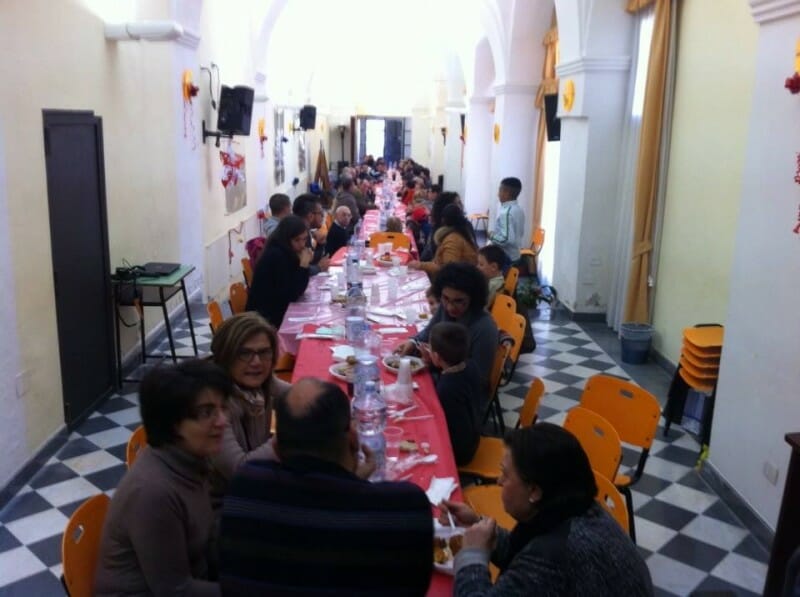
Jun 5, 2015 | Focolare Worldwide
 “Last September,” says Luigi, trade unionist, who seeks to live the spirituality of unity along with Fr. Peppino and others in the parish, “we had the idea to organize meals for solidarity for those on the margins of society, for the lonely.” The place to do it? “We realized that with a little work the space we use for parish meetings could become a welcoming dining room. It wasn’t even difficult to make the guest list. Their faces are familiar to us: people we see on the street, who live in the same neighbourhoods where we live, who are our next door neighbours, those who are helped by the Caritas, the elderly, foreigners…” “We started by dividing up the tasks to be done,” interjects Grace. “One offered to do the shopping, notifying restaurants and supermarkets; one offered to cook, with close attention to preparing dishes that even our Muslim friends could eat. The strongest offered to fix up the room and the teen girls offered to prepare the entertainment. A well-rounded team: young people, adults, and even children.” The first lunch was held in October 2014. For everyone involved it was a sunny Sunday, as was the radiant face of the elderly man with the cane and the woman who loved to dance and enjoyed herself so much. A few days before Christmas, the second lunch was held. “You can’t imagine the joy of the anticipation,” remembers Vincent, “when the hall was opened there were already a few elderly participants sitting on a bench waiting. As soon as they saw us they came to embrace us and give us the season’s greetings, and then went to find a place to sit. Immediately after wards all the others arrived, including the children and their parents. Between courses there was music and karaoke, and then the Moroccan girls instructed everyone in dances to songs from their country.” The children, meanwhile, played, coloured, and tried to wait patiently for the big surprise…the arrival of Santa Claus, who distributed gifts for everyone. “For us, the organizers, there were no wrapped presents,” says Carla, “but we received a much more precious gift: the scene of all those people, finally smiling and happy.” After the Christmas lunch followed that of Epiphany, and still many others: a tradition which continues, and each time becomes a chance to intertwine oneself in many cultures and religions. Among the guests, who gradually become more and more numerous, there are Arabians, Ukrainians, Catholics, Orthodox, Evangelicals, people of no religious conviction and especially many Muslims. “Is there difficulty? Commitment? Problems? Of course,” admits Luigi, “because it isn’t easy to organize meals like these from nothing. But the joy that moments like these bring us is indescribable, leaving in each of us the desire and the inventiveness to do more. They are truly opportunities to grow as a person and to grow in the sense of community, in us organizers and in the guests, who are no longer guests but truly brothers and sisters.”
“Last September,” says Luigi, trade unionist, who seeks to live the spirituality of unity along with Fr. Peppino and others in the parish, “we had the idea to organize meals for solidarity for those on the margins of society, for the lonely.” The place to do it? “We realized that with a little work the space we use for parish meetings could become a welcoming dining room. It wasn’t even difficult to make the guest list. Their faces are familiar to us: people we see on the street, who live in the same neighbourhoods where we live, who are our next door neighbours, those who are helped by the Caritas, the elderly, foreigners…” “We started by dividing up the tasks to be done,” interjects Grace. “One offered to do the shopping, notifying restaurants and supermarkets; one offered to cook, with close attention to preparing dishes that even our Muslim friends could eat. The strongest offered to fix up the room and the teen girls offered to prepare the entertainment. A well-rounded team: young people, adults, and even children.” The first lunch was held in October 2014. For everyone involved it was a sunny Sunday, as was the radiant face of the elderly man with the cane and the woman who loved to dance and enjoyed herself so much. A few days before Christmas, the second lunch was held. “You can’t imagine the joy of the anticipation,” remembers Vincent, “when the hall was opened there were already a few elderly participants sitting on a bench waiting. As soon as they saw us they came to embrace us and give us the season’s greetings, and then went to find a place to sit. Immediately after wards all the others arrived, including the children and their parents. Between courses there was music and karaoke, and then the Moroccan girls instructed everyone in dances to songs from their country.” The children, meanwhile, played, coloured, and tried to wait patiently for the big surprise…the arrival of Santa Claus, who distributed gifts for everyone. “For us, the organizers, there were no wrapped presents,” says Carla, “but we received a much more precious gift: the scene of all those people, finally smiling and happy.” After the Christmas lunch followed that of Epiphany, and still many others: a tradition which continues, and each time becomes a chance to intertwine oneself in many cultures and religions. Among the guests, who gradually become more and more numerous, there are Arabians, Ukrainians, Catholics, Orthodox, Evangelicals, people of no religious conviction and especially many Muslims. “Is there difficulty? Commitment? Problems? Of course,” admits Luigi, “because it isn’t easy to organize meals like these from nothing. But the joy that moments like these bring us is indescribable, leaving in each of us the desire and the inventiveness to do more. They are truly opportunities to grow as a person and to grow in the sense of community, in us organizers and in the guests, who are no longer guests but truly brothers and sisters.”
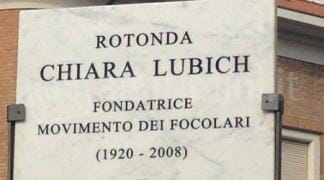
Jun 4, 2015 | Focolare Worldwide
 In a ceremony held on Saturday May 30th, a traffic circle was dedicated to Chiara Lubich, foundress of the Focolare Movement and honorary citizen of Rimini, between Savonarola Street, Giacomo Matteotti Boulevard, and Mille Street, overlooking the University complex “Navigare Necesse.” “A moment of attention for an important figure connected to our city,” said Irina Imola, the assessor to the General Services of the municipality of Rimini, who opened the ceremony. “For this, I thank all the authorities present and the many who have drawn teaching and comfort from the work of Chiara Lubich.” In 1997 the Municipality of Rimini had conferred upon Chiara Lubich honorary citizenship, “for her work of construction,” among the motivations expressed by the City Council, “of a civilization of love, tolerance, and solidarity among peoples.” Source: Altarimini online
In a ceremony held on Saturday May 30th, a traffic circle was dedicated to Chiara Lubich, foundress of the Focolare Movement and honorary citizen of Rimini, between Savonarola Street, Giacomo Matteotti Boulevard, and Mille Street, overlooking the University complex “Navigare Necesse.” “A moment of attention for an important figure connected to our city,” said Irina Imola, the assessor to the General Services of the municipality of Rimini, who opened the ceremony. “For this, I thank all the authorities present and the many who have drawn teaching and comfort from the work of Chiara Lubich.” In 1997 the Municipality of Rimini had conferred upon Chiara Lubich honorary citizenship, “for her work of construction,” among the motivations expressed by the City Council, “of a civilization of love, tolerance, and solidarity among peoples.” Source: Altarimini online
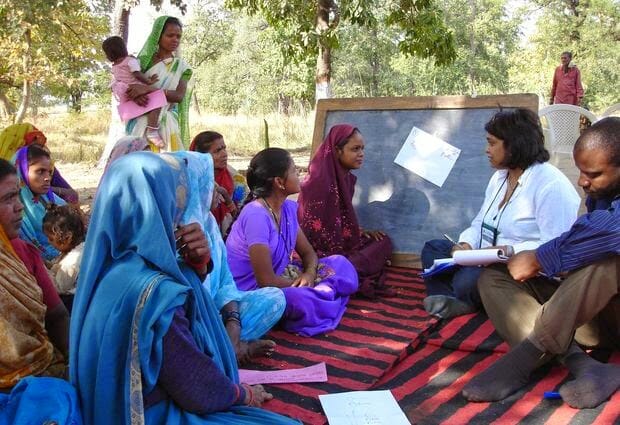
Jun 4, 2015 | Non categorizzato
 While gender is the topic under discussion in the Western world, in developing countries the concern is for the tragedy of exploitation; in the Middle East the rights of women, and peace. Still in the West, women forced to choose between work and family; lives that are subjected to violence… These are a few of the challenges and problems – differing according to the various geographical areas – in discussion at the United Nations, in view of the new agenda for the Sustainable Development Goals, to be carried out after the year 2015 (the date by which the 193 member states hoped to achieve the famous Millennium Development Goals). These challenges and problems were also discussed during the three days sponsored by the Pontifical Council for Justice and Peace (Rome, May 22-24, 2015), in collaboration with the World Union of Catholic Women’s Organizations and the World Women’s Alliance for Life and Family. Not only an overview of the most urgent issues linked to woman’s conditions, nor a mere moment of condemnation of the violations of her dignity and her rights. The 120 women from different countries wanted to offer a contribution of experiences and ideas, then synthesized in a final document towards the new United Nations Post-2015 Development Agenda. In his message to Cardinal Turkson, president of Justice and Peace, Pope Francis wanted to give voice to the petitions promoted by the Catholic feminine world in international proceedings, inviting those who are “engaged in defending the dignity of women and promoting their rights,” to allow themselves “to be constantly guided by the spirit of humanity and compassion” in the service of their neighbours. “In this way,” continues the pope, “you will manifest the countless God-given gifts which women have to offer, encouraging others to promote sensitivity, understanding and dialogue in settling conflicts big and small, in healing wounds, in nurturing all life at every level of society, and in embodying the mercy and tenderness which bring reconciliation and unity to our world.” The contributions ranged from: feminine anthropology, women and education, women and interreligious dialogue, technologies related to life and to procreation, human rights, women and agricultural work, to business and finance etc., followed by work in thematic atelier, or workshops (a term which recalls the “artisan work” of finesse and industriousness, typical of women) on the Sustainable Development Goals, for an elaboration of proposals. Rita Mousallem, co-director of the Centre for Interreligious Dialogue of the Focolare Movement, spoke on the subject of “Interreligious Dialogue, means for a lasting peace. The roll of women,” taking inspiration from her personal experience as a Christian in the Middle East. In the various interviews to which she responded, she stressed the ability to listen, a typical characteristic of women, which provides the possibility to enter into the innermost part of oneself and of others; to know how to suffer and how to hope until the end, because – being a mother – she well knows the value of life. These aspects and others are part of that “feminine genius” – also quoted by Pope Francis – the gift and beauty typical of woman, called to give her contribution to today’s society, for the benefit of all. Read more: Aleteia
While gender is the topic under discussion in the Western world, in developing countries the concern is for the tragedy of exploitation; in the Middle East the rights of women, and peace. Still in the West, women forced to choose between work and family; lives that are subjected to violence… These are a few of the challenges and problems – differing according to the various geographical areas – in discussion at the United Nations, in view of the new agenda for the Sustainable Development Goals, to be carried out after the year 2015 (the date by which the 193 member states hoped to achieve the famous Millennium Development Goals). These challenges and problems were also discussed during the three days sponsored by the Pontifical Council for Justice and Peace (Rome, May 22-24, 2015), in collaboration with the World Union of Catholic Women’s Organizations and the World Women’s Alliance for Life and Family. Not only an overview of the most urgent issues linked to woman’s conditions, nor a mere moment of condemnation of the violations of her dignity and her rights. The 120 women from different countries wanted to offer a contribution of experiences and ideas, then synthesized in a final document towards the new United Nations Post-2015 Development Agenda. In his message to Cardinal Turkson, president of Justice and Peace, Pope Francis wanted to give voice to the petitions promoted by the Catholic feminine world in international proceedings, inviting those who are “engaged in defending the dignity of women and promoting their rights,” to allow themselves “to be constantly guided by the spirit of humanity and compassion” in the service of their neighbours. “In this way,” continues the pope, “you will manifest the countless God-given gifts which women have to offer, encouraging others to promote sensitivity, understanding and dialogue in settling conflicts big and small, in healing wounds, in nurturing all life at every level of society, and in embodying the mercy and tenderness which bring reconciliation and unity to our world.” The contributions ranged from: feminine anthropology, women and education, women and interreligious dialogue, technologies related to life and to procreation, human rights, women and agricultural work, to business and finance etc., followed by work in thematic atelier, or workshops (a term which recalls the “artisan work” of finesse and industriousness, typical of women) on the Sustainable Development Goals, for an elaboration of proposals. Rita Mousallem, co-director of the Centre for Interreligious Dialogue of the Focolare Movement, spoke on the subject of “Interreligious Dialogue, means for a lasting peace. The roll of women,” taking inspiration from her personal experience as a Christian in the Middle East. In the various interviews to which she responded, she stressed the ability to listen, a typical characteristic of women, which provides the possibility to enter into the innermost part of oneself and of others; to know how to suffer and how to hope until the end, because – being a mother – she well knows the value of life. These aspects and others are part of that “feminine genius” – also quoted by Pope Francis – the gift and beauty typical of woman, called to give her contribution to today’s society, for the benefit of all. Read more: Aleteia
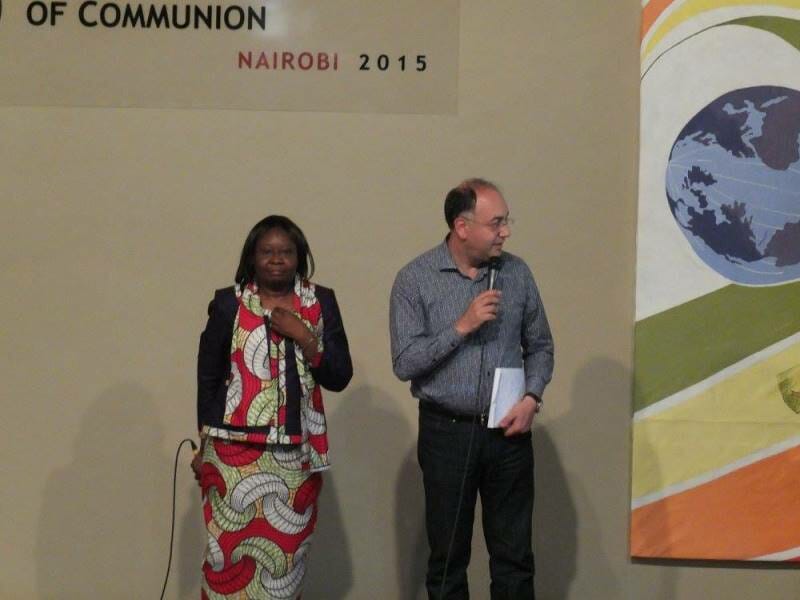
Jun 3, 2015 | Focolare Worldwide
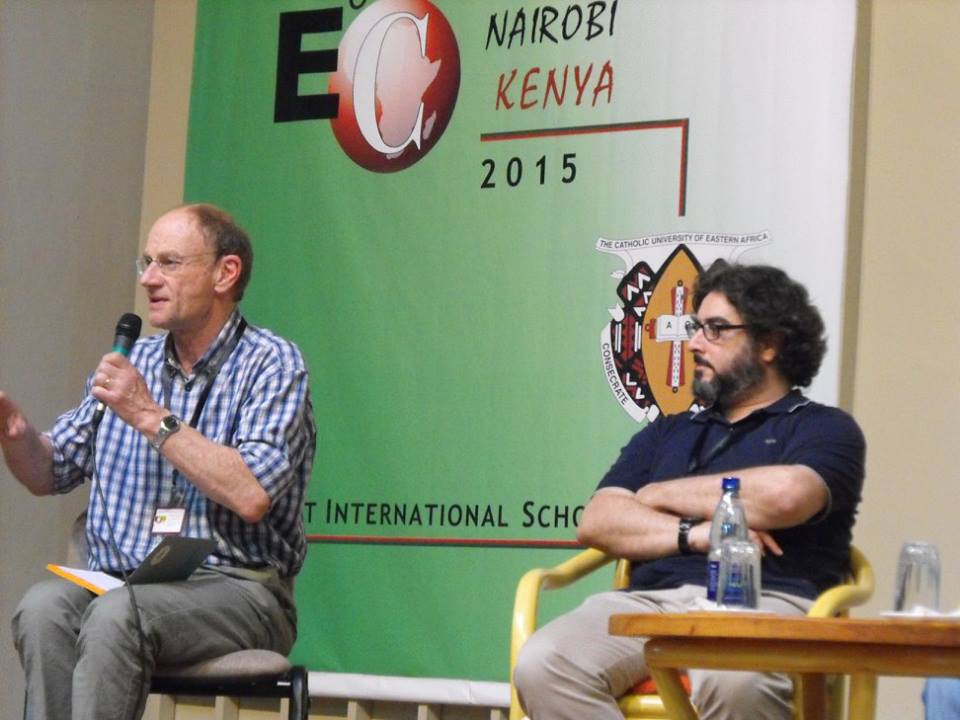 In order to look toward the future, on the last day of the meeting, the Congress turned its gaze on the new generations. With the first engaging words of Anouk Grevin, Professor of Management at the University of Nantes and member of the International Commission of the EoC, everyone broke into applause: “When a baby is born,” he said, “the whole community shows care, the child that was born belongs to everyone.” His words express one of the most important values of the African continent and that is,”You need a village to grow a child”. Grevin went on to say, “We lived such wonderful dreams with the young people at the International EoC School!” With much enthusiasm Anouk moved around the hall. The walls were covered with pictures of the young people’s projects, and their dreams. With unique creativity and a passion that would be difficult to describe, the young people presented those projects: some already underway, others only dreams, although for them that didn’t matter! John Mundell launched an appeal to his friends: open your businesses to introduce these new generations into the work world: “The experience in an EoC business makes you experience a wealth of true relationships along with professionalism!”
In order to look toward the future, on the last day of the meeting, the Congress turned its gaze on the new generations. With the first engaging words of Anouk Grevin, Professor of Management at the University of Nantes and member of the International Commission of the EoC, everyone broke into applause: “When a baby is born,” he said, “the whole community shows care, the child that was born belongs to everyone.” His words express one of the most important values of the African continent and that is,”You need a village to grow a child”. Grevin went on to say, “We lived such wonderful dreams with the young people at the International EoC School!” With much enthusiasm Anouk moved around the hall. The walls were covered with pictures of the young people’s projects, and their dreams. With unique creativity and a passion that would be difficult to describe, the young people presented those projects: some already underway, others only dreams, although for them that didn’t matter! John Mundell launched an appeal to his friends: open your businesses to introduce these new generations into the work world: “The experience in an EoC business makes you experience a wealth of true relationships along with professionalism!” 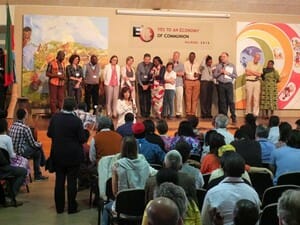 The real life events of the business people from around the world – especially the young people – gave glimpses of a better future: from Italy to Argentina, to Paraguay, to the presentation of a thesis on the EoC by a young Brazilian woman who is about to finish her studies at Sophia Institute. If today our gaze is pointed towards the future-present, then it is an important moment for making strong and binding commitments: “We should promise ourselves that we will never turn back,” said Luigino Bruni. “ We’ve lived some miracles over the past few days, our stories that need to be told to everyone. The EoC isn’t a consumer good, many people in the world waiting for it. We need to continue to be “producers” of communion, not only its consumers.” The final statement was a powerful appeal. The promise to give one’s life for an economy of communion. Then the business people wished to leave a visible sign of their personal commitment, which materialised in the form of a “pact,” which everyone was free to sign.
The real life events of the business people from around the world – especially the young people – gave glimpses of a better future: from Italy to Argentina, to Paraguay, to the presentation of a thesis on the EoC by a young Brazilian woman who is about to finish her studies at Sophia Institute. If today our gaze is pointed towards the future-present, then it is an important moment for making strong and binding commitments: “We should promise ourselves that we will never turn back,” said Luigino Bruni. “ We’ve lived some miracles over the past few days, our stories that need to be told to everyone. The EoC isn’t a consumer good, many people in the world waiting for it. We need to continue to be “producers” of communion, not only its consumers.” The final statement was a powerful appeal. The promise to give one’s life for an economy of communion. Then the business people wished to leave a visible sign of their personal commitment, which materialised in the form of a “pact,” which everyone was free to sign.

Genéviève Sanzé and Luigino Bruni addressing the conference
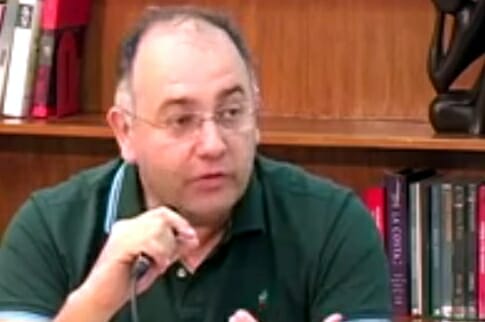
Jun 3, 2015 | Focolare Worldwide
 “The Economy of Communion (EoC) has returned to Africa. We’re here from around world, drawn by both the blessings and the wounds of this great continent, to take a look at the world economy from an African perspective; also to be taught by these peoples, by their great calling to life, social relationships and encounter. I have always been struck by Africa’s ability to create, and by its life. There is a lot of dancing in Africa, a lot of feasting and celebration. One thing that I find stupendous in Africa is that you even see elderly women dancing. Nowadays, in Europe and in the Northern hemisphere it is less common to see elderly men and women freely celebrating and dancing over the joy of being together. We also came to Africa to learn how to dance, men, women and children. Africa certainly has a vocation to generate life in all of its dimensions. The sense of brotherhood with the earth and with all of nature is a great value of African culture. This is one of the many gifts that Africa offers to the entire Economy of Communion worldwide, and many future generations should make this discovery. What messages can reach the Africa of today from the EoC? We will take the time to tell our stories, both great and small, and from there we will set out into a new land. The first contribution that the EoC would like to take to Africa is appreciation and esteem for what Africa already is and not only for what it might become. The people’s first strength is their dreams, especially their collective dreams and those of the poor. Generating is very connected to an economic term that is important for Africa and for everyone: innovation. A first message that we receive from the logic of this new budding is subsidiatiry: our hands and our technology can only subsidize, that is, help the bud to bloom; they cannot invent it. The economic and social innovations of Africa will grow primarily from its own soil, from its land and not from the outside. The gift of the EoC is that of having eyes that can see buds where others see only deserts. There are many young people here in Africa who have already begun the walk, often together: and it is from these buds that we should learn to see the forest. The essential energy of any undertaking is the hunger for life, and for the future of young people and the poor, who are very abundant here in Africa. In order for the poor and excluded to become an engine of change of a country, the role of political and economic institutions is essential. New financial institutions are being born from the EoC. But banks and all the other institutions are only able to assist economic innovations, not create or invent them. Without people with creativity, talent, competence and passion, you will never give rise to the experience of a new economy. It is necessary that each individual activates his or her own innovative skills and, if possible, join it to that of others who have the same wish to do and create. Our dream is to create one of these institutions right here at Mariapolis Piero. It will be a centre that can be a place for trust, for accompanying and serving new EoC ideas that will be born especially from young people.”
“The Economy of Communion (EoC) has returned to Africa. We’re here from around world, drawn by both the blessings and the wounds of this great continent, to take a look at the world economy from an African perspective; also to be taught by these peoples, by their great calling to life, social relationships and encounter. I have always been struck by Africa’s ability to create, and by its life. There is a lot of dancing in Africa, a lot of feasting and celebration. One thing that I find stupendous in Africa is that you even see elderly women dancing. Nowadays, in Europe and in the Northern hemisphere it is less common to see elderly men and women freely celebrating and dancing over the joy of being together. We also came to Africa to learn how to dance, men, women and children. Africa certainly has a vocation to generate life in all of its dimensions. The sense of brotherhood with the earth and with all of nature is a great value of African culture. This is one of the many gifts that Africa offers to the entire Economy of Communion worldwide, and many future generations should make this discovery. What messages can reach the Africa of today from the EoC? We will take the time to tell our stories, both great and small, and from there we will set out into a new land. The first contribution that the EoC would like to take to Africa is appreciation and esteem for what Africa already is and not only for what it might become. The people’s first strength is their dreams, especially their collective dreams and those of the poor. Generating is very connected to an economic term that is important for Africa and for everyone: innovation. A first message that we receive from the logic of this new budding is subsidiatiry: our hands and our technology can only subsidize, that is, help the bud to bloom; they cannot invent it. The economic and social innovations of Africa will grow primarily from its own soil, from its land and not from the outside. The gift of the EoC is that of having eyes that can see buds where others see only deserts. There are many young people here in Africa who have already begun the walk, often together: and it is from these buds that we should learn to see the forest. The essential energy of any undertaking is the hunger for life, and for the future of young people and the poor, who are very abundant here in Africa. In order for the poor and excluded to become an engine of change of a country, the role of political and economic institutions is essential. New financial institutions are being born from the EoC. But banks and all the other institutions are only able to assist economic innovations, not create or invent them. Without people with creativity, talent, competence and passion, you will never give rise to the experience of a new economy. It is necessary that each individual activates his or her own innovative skills and, if possible, join it to that of others who have the same wish to do and create. Our dream is to create one of these institutions right here at Mariapolis Piero. It will be a centre that can be a place for trust, for accompanying and serving new EoC ideas that will be born especially from young people.”
![Poland: Christian-Muslim Dialogue in Katowice]()
Jun 1, 2015 | Non categorizzato
 In Poland, with its population of 38 million, 90% of whom are Christian, the Muslims are a religious minority. They number 25 thousand, 0.08% of the population. Their presence presence back to the Tartars of the 14th century; then there was the immigration of the second half of the 20th century and the years after the Berlin wall. The recent day of dialogue is inserted amongst three major events in the ongoing dialogue amongst Christians and Muslims in Poland. Father Adam Was, from the Polish Catholic Bishops Conference’s Committee for non-Christian Religions, describes the event: The Day of Islam in the Catholic Church in Poland, instituted in 2000 by the Polish Catholic Bishops Conference at the request of the Mixed Council of Catholics and Muslims, is celebrated each year on June 26; also the Prayer of Peace and Justice in the World, begun in the aftermath of September 11, 2001, promoted by Polish Tartars; and finally “the unprecedented event,” as described by Mufti Nedal abu Tabaq, the “Christians Amongst Muslims in Poland,” established on May 29, 2015 and begun three years ago by the Muslim League in Poland. Fifty guests were invited to speak at the event, invited by Imam Abdul Jabbar Koubaisy, Director of the Centre and vice-president of the Muslim League in Poland: local civil authorities, representatives from the Catholic, Orthodox and Lutheran Churches; representatives from the University of Silesia and from the Jewish Community of Katowice. Focolare president, Maria Voce, and co-president Jesús Morán were the guests of honour.
In Poland, with its population of 38 million, 90% of whom are Christian, the Muslims are a religious minority. They number 25 thousand, 0.08% of the population. Their presence presence back to the Tartars of the 14th century; then there was the immigration of the second half of the 20th century and the years after the Berlin wall. The recent day of dialogue is inserted amongst three major events in the ongoing dialogue amongst Christians and Muslims in Poland. Father Adam Was, from the Polish Catholic Bishops Conference’s Committee for non-Christian Religions, describes the event: The Day of Islam in the Catholic Church in Poland, instituted in 2000 by the Polish Catholic Bishops Conference at the request of the Mixed Council of Catholics and Muslims, is celebrated each year on June 26; also the Prayer of Peace and Justice in the World, begun in the aftermath of September 11, 2001, promoted by Polish Tartars; and finally “the unprecedented event,” as described by Mufti Nedal abu Tabaq, the “Christians Amongst Muslims in Poland,” established on May 29, 2015 and begun three years ago by the Muslim League in Poland. Fifty guests were invited to speak at the event, invited by Imam Abdul Jabbar Koubaisy, Director of the Centre and vice-president of the Muslim League in Poland: local civil authorities, representatives from the Catholic, Orthodox and Lutheran Churches; representatives from the University of Silesia and from the Jewish Community of Katowice. Focolare president, Maria Voce, and co-president Jesús Morán were the guests of honour.  ”Interreligious dialogue is a necessary condition for peace in the world, and so it is a duty for Christians as well as other religious communities” (EG, 250), recalled Metropolitan of Katowice, Archbishop Wiktor Skwore, in his message that was ready by Father Tadeusz Czakański, the Metropolitan’s delegate for the dialogue with Islam. And focusing in on the theme of the meeting, he underscored how: the foundation of the entire teaching of Jesus Christ lies in merciful love towards one’s neighbour,” and he wished that this interreligious meeting in Katowice would help all “to live more deeply the mystery of God’s Mercy” and that “it would contribute to a greater openness towards one another, to more efficient cooperation on the ground in caring for the marginalised and oppressed.” Then, in her speech, Maria Voce recalled some passages of the Christian Scriptures that speak of Jesus even before his birth, highlighting his concrete love towards the human person. “It was this universal love, without reservations that has fascinated everyone who belongs to the Focolare, and it has become our rule of life,” the Focolare president noted. One of Chiara Lubich’s intuitions, which constitutes one of the fundamental points of her spirituality of unity, was the discovery of the Jesus’ commandment par excellence: ‘This is my commandment: love one another as I love you. No one has greater love, to lay down one’s life for one’s friends” (Jn 15:12-13). “Loving in this way is not always easy,” Maria Voce admitted, “at times, or very often this love towards our brother or sister requires sacrifice and fatigue. . . But also here Jesus is the model: he loved to the point of giving his life for us.” In concluding, she expressed her wish that: God, “the greatest and most merciful, would help us to look upon everyone with the gaze of a brother or sister, with the measure of love that he revealed to us, so that together we can build a world that everyone is waiting for where brotherhood and true peace reign.” While speaking of Jesus Christ, Mufti Nedal Abu Tabaq, who is responsible over all the Imams in Poland, affirmed that in the Koran it is written that “Jesus is the sign”. “He was not only miraculously conceived, but he also performed miracles, cured the sick, raised the dead. Each one of us must resuscitate the light in those who suffer (. . .) We are not candles that can burn out; we are the fire that is already come forth from it, and this light is present in every human being, but we must revive it, make it emerge (. . .) in the needs, as Jesus Christ had done (. . .) This is the Jesus whom I love, whom I know, whom I praise.” Common action in favour of interreligious dialogue: the threat against the value of the family and the need, as believers, to protect it; educating children in dialogue: these were a few of the issues that were dealt with in a fraternal dialogue with Maria Voce and Jesús Morán, during the second part of the programme. The programme concluded with the Lord’s Prayer recited by Christians and the Dua recited by Muslims. There was a sign of peace, expressed in a handshake or embrace celebrating the fraternal love that was experienced in those hours amongst Christians, Muslims and Jews.
”Interreligious dialogue is a necessary condition for peace in the world, and so it is a duty for Christians as well as other religious communities” (EG, 250), recalled Metropolitan of Katowice, Archbishop Wiktor Skwore, in his message that was ready by Father Tadeusz Czakański, the Metropolitan’s delegate for the dialogue with Islam. And focusing in on the theme of the meeting, he underscored how: the foundation of the entire teaching of Jesus Christ lies in merciful love towards one’s neighbour,” and he wished that this interreligious meeting in Katowice would help all “to live more deeply the mystery of God’s Mercy” and that “it would contribute to a greater openness towards one another, to more efficient cooperation on the ground in caring for the marginalised and oppressed.” Then, in her speech, Maria Voce recalled some passages of the Christian Scriptures that speak of Jesus even before his birth, highlighting his concrete love towards the human person. “It was this universal love, without reservations that has fascinated everyone who belongs to the Focolare, and it has become our rule of life,” the Focolare president noted. One of Chiara Lubich’s intuitions, which constitutes one of the fundamental points of her spirituality of unity, was the discovery of the Jesus’ commandment par excellence: ‘This is my commandment: love one another as I love you. No one has greater love, to lay down one’s life for one’s friends” (Jn 15:12-13). “Loving in this way is not always easy,” Maria Voce admitted, “at times, or very often this love towards our brother or sister requires sacrifice and fatigue. . . But also here Jesus is the model: he loved to the point of giving his life for us.” In concluding, she expressed her wish that: God, “the greatest and most merciful, would help us to look upon everyone with the gaze of a brother or sister, with the measure of love that he revealed to us, so that together we can build a world that everyone is waiting for where brotherhood and true peace reign.” While speaking of Jesus Christ, Mufti Nedal Abu Tabaq, who is responsible over all the Imams in Poland, affirmed that in the Koran it is written that “Jesus is the sign”. “He was not only miraculously conceived, but he also performed miracles, cured the sick, raised the dead. Each one of us must resuscitate the light in those who suffer (. . .) We are not candles that can burn out; we are the fire that is already come forth from it, and this light is present in every human being, but we must revive it, make it emerge (. . .) in the needs, as Jesus Christ had done (. . .) This is the Jesus whom I love, whom I know, whom I praise.” Common action in favour of interreligious dialogue: the threat against the value of the family and the need, as believers, to protect it; educating children in dialogue: these were a few of the issues that were dealt with in a fraternal dialogue with Maria Voce and Jesús Morán, during the second part of the programme. The programme concluded with the Lord’s Prayer recited by Christians and the Dua recited by Muslims. There was a sign of peace, expressed in a handshake or embrace celebrating the fraternal love that was experienced in those hours amongst Christians, Muslims and Jews.













